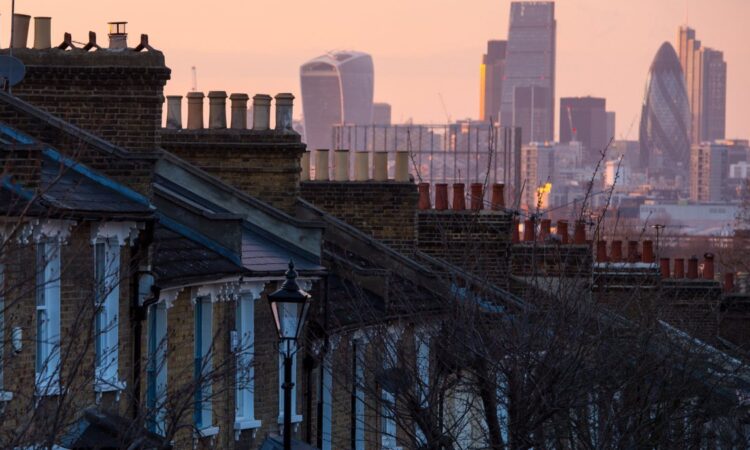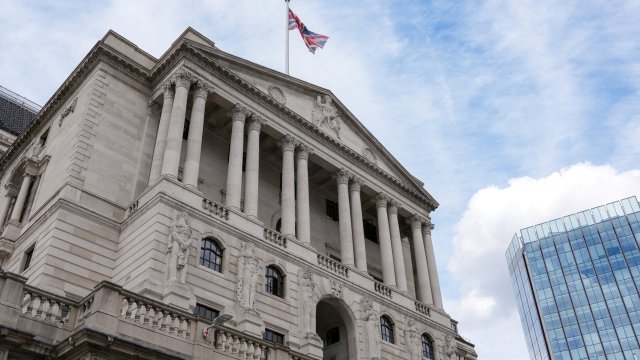
Homeowners can now benefit from a fixed mortgage deal with a market leading rate of 5 per cent, as the rate war continues to hot up.
The five year offer from Coventry Building Society is available to customers buying new homes, so long as they have a deposit of at least 35 per cent, reduced by 20 percentage points.
It is the latest provider to cut rates following Nationwide, NatWest and HSBC all reducing rates by up to 0.29 percentage points this week, with smaller lenders also following suit.
Currently, the average two-year fixed rate is 6.62 per cent, while the five year fixed rate is 6.11 per cent, according to Moneyfacts.
Cuts have been happening throughout the week, despite the fact the Bank of England is expected to announce an increase to the base rate next week.
Experts are now predicting that more rates reaching near 5 per cent “could easily come next week.”
David Hollingworth, a broker for L&C mortgages, said the new deal being offered by Coventry is positive news for those looking to purchase a home.
“It’s a clear demonstration of the current downwards trend as we see rates come down further. We’ll be hoping that if that continues, we could very quickly see rates below 5 per cent.”
Chris Sykes of brokers Private Finance added that he “wouldn’t be surprised” if we see a five-year fixed under 5 per cent soon.
Lenders have been able to lower price in recent times as swap rates – the rate at which banks lend money to each other – are going down. Currently, one year swaps are at 5.5 per cent, which reflects the assumption the base rate is due to peak in the near future.
Swap rates have already priced in the expected 0.25 percentage point hike to existing deals, meaning they are unlikely to be hiked.
Aaron Strutt, of brokers Trinity Financial, told i: “The lenders have been telling us that the cost of funding mortgages is cheaper so they can lower their rates. Many of the banks and building societies have been very quick to raise rates recently, so it’s good to see them reversing some of the rate hikes.”
As rates are falling, homeowners have been left in a dilemma about whether to fix rates now, if their deal is coming to an end or if they are on a variable mortgage, or gamble on them falling even further.
Should you fix your mortgage or wait until rates fall further?
Experts have said people looking at the attractive deals coming on offer should consider locking deals in ahead of time.
Most people can secure a deal six months before their existing mortgage comes to an end in order to avoid losing a good deal and having to accept a higher rate at a later stage.
Sykes, who works at Private Finance, said: “If looking to remortgage soon my advice is always to look at things around six months early.
“Although at the moment we are looking to be in a downward fixed rate environment we’ve all seen over the last year how fast things can change so it is always worth getting something locked in. When doing this double check it can be cancelled and the rate can be changed if things improve.”
Some experts believe homeowners are “more secure” if they have a fixed deal in place now.
Strutt added: “It’s worth getting a deal now, but then keep it under review. You would still be able to take advantage of dropping rates either with that lender or a different one and just start over. It’s highly unlikely that you will have any kind of upfront costs that you might risk losing.”
However, it will depend on an individuals circumstance as to whether they decide to fix or move onto a variable or tracker rate, which tends to follow the base rate.
The upside of a tracker is that homeowners potentially have the ability to switch to a lower fixed rate if or when rates start to come back down and without penalty.
The downside is there will likely be at least one further rate hike, which means there is no security that rates will fall in the immediate future.
Jonathan Harris, managing director of mortgage broker Forensic Property Finance, said: “A fixed-rate option provides immediate security but if rates do start to fall, you won’t be able to take advantage.
“However, a two-year window is a relatively short period of time in the scheme of things so you are minimising your risk in that sense. At present, it is really down to the individual borrower.”







